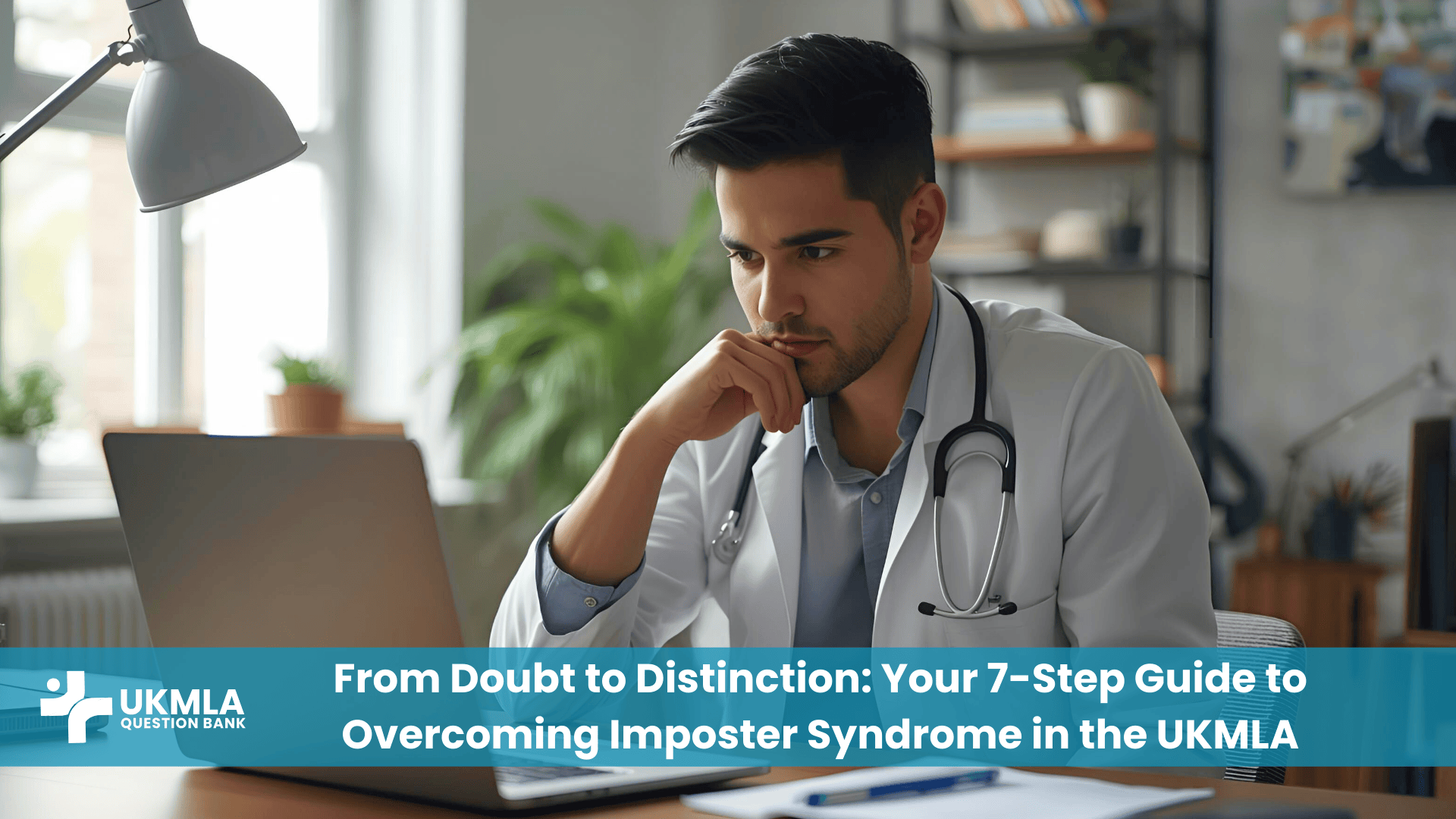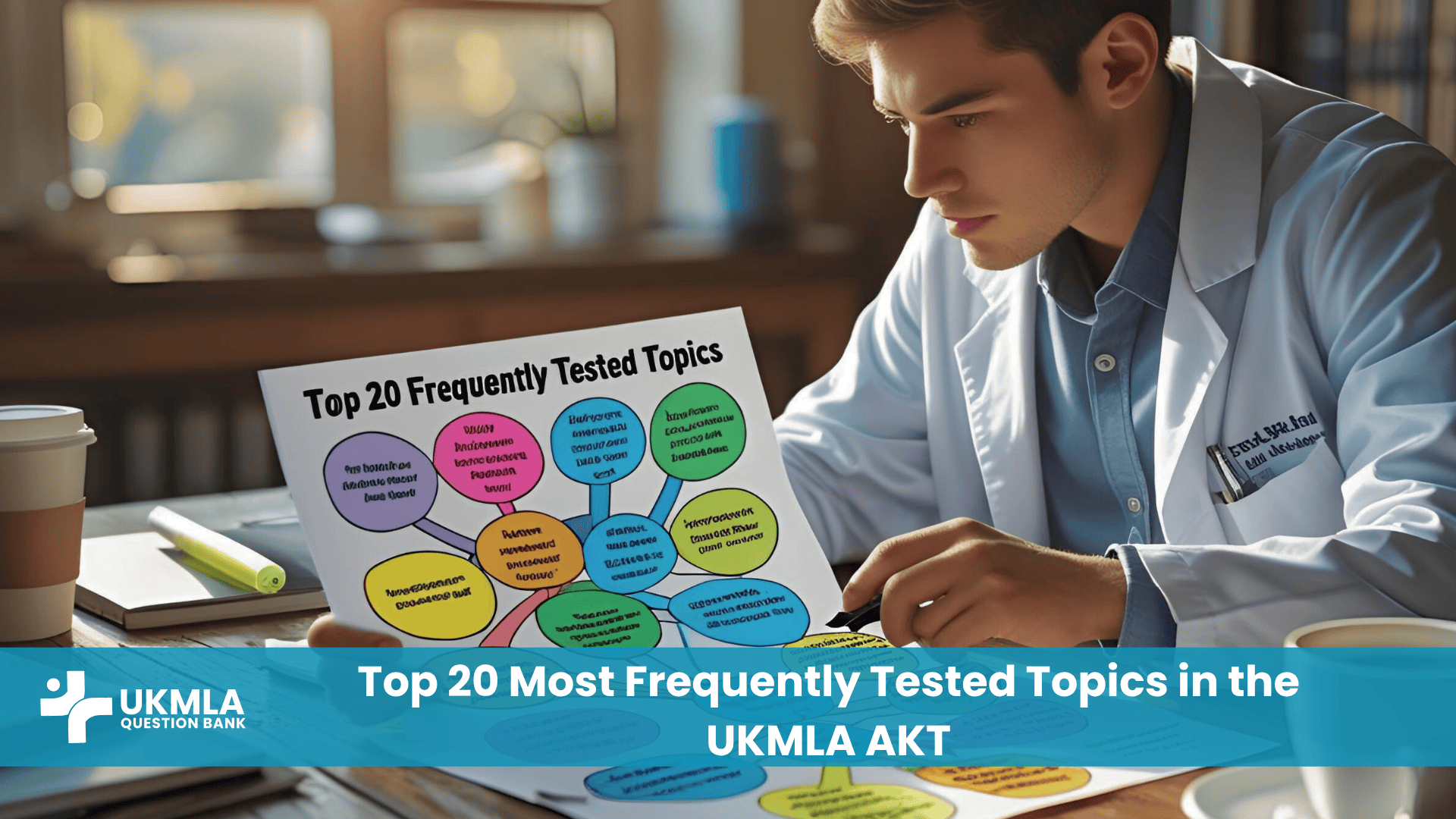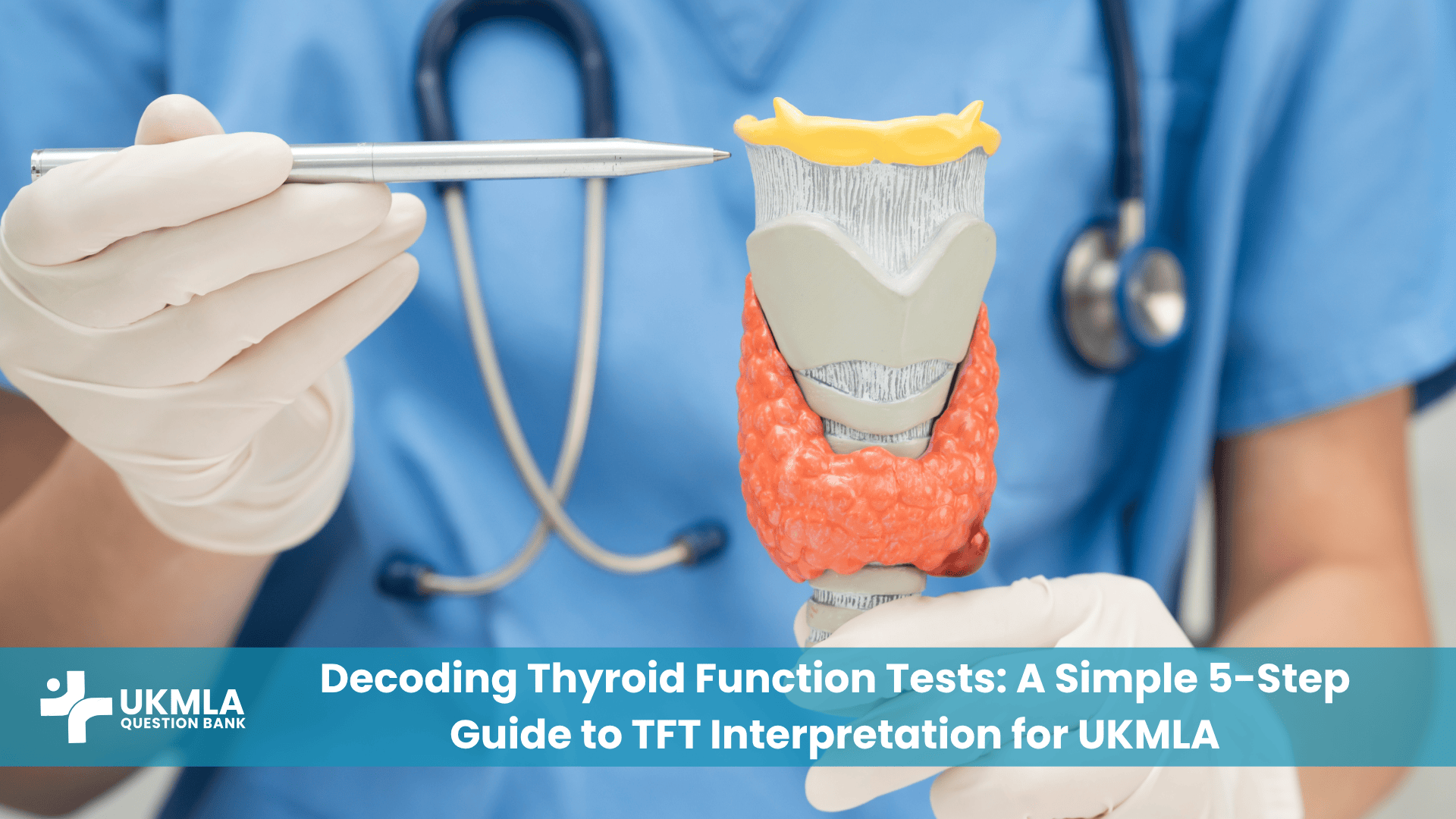Introduction
The feeling of imposter syndrome UKMLA candidates experience is a pervasive, silent challenge that can undermine even the most diligent preparation. It’s that nagging voice in your head, the one that whispers you’re a fraud, that your successes are due to luck, and that you’ll soon be exposed as incompetent, despite objective evidence to the contrary. This psychological pattern isn’t just a bout of pre-exam jitters; it’s a deeply ingrained belief system that can erode your confidence, increase burnout, and prevent you from performing at your best when it matters most.
In this comprehensive guide, we will dismantle the architecture of imposter syndrome within the context of medical education. We’ll move beyond simple definitions to explore why this phenomenon is so prevalent among high-achievers on the path to becoming doctors. More importantly, we will provide you with a practical, evidence-based 7-step framework to not only manage these feelings but to build a resilient, earned confidence that will carry you through the UKMLA and into your foundation years.
Table of Contents
ToggleWhat Is Imposter Syndrome, Really?
First coined by psychologists Pauline Clance and Suzanne Imes in 1978, imposter syndrome is not a formal psychiatric diagnosis but a persistent pattern of self-doubt. It’s the internal experience of feeling like a phony, unable to internalise and own your accomplishments. You might constantly worry that others will discover you’re not as intelligent or capable as they think you are.
The British Medical Association (BMA) acknowledges this challenge, particularly for those entering new and demanding roles, noting that it can lead to a fear of failure that stifles growth. For a medical student or junior doctor, this can manifest as hesitating to answer questions on ward rounds, excessively second-guessing clinical decisions, or attributing a high score on a practice exam to an easy question set rather than your own knowledge.
Beyond Humility: Defining the Inner Critic
It’s crucial to distinguish imposter syndrome from genuine humility. Humility is a balanced self-view; it’s the ability to acknowledge your strengths while recognising your limitations and the need for continuous learning—a cornerstone of good medical practice. Imposter syndrome, however, is a cognitive distortion. It’s an imbalanced self-view that fixates on perceived flaws and dismisses tangible evidence of your competence. Your inner critic takes centre stage, loudly narrating a story of inadequacy while your inner mentor is silenced.
The Five Common Types of Imposter Syndrome
Dr. Valerie Young, a leading expert on the topic, identified five common “competence types” through which imposter syndrome can manifest. Recognising your own pattern is the first step toward dismantling it.
Table 1: The Five Types of Imposter Syndrome
| Type | Description | Internal Monologue Example |
|---|---|---|
| The Perfectionist | Sets excessively high standards for themselves. Believes they should have done better even with a 99% success rate. Focuses on the 1% they missed. | “I missed one question on that practice paper; I’m clearly not ready for the UKMLA AKT.” |
| The Superhuman | Pushes themselves to work harder than those around them to prove they are not imposters. Feels they must succeed in all aspects of life (student, friend, athlete) simultaneously. | “I have to read all of the NICE guidelines tonight, volunteer tomorrow, and finish my audit, or I’m falling behind everyone else.” |
| The Natural Genius | Believes true competence means mastering a skill with little effort. If they have to work hard at something, they feel shame and believe they aren’t smart enough. | “This respiratory concept is taking me a long time to grasp. I should have understood it immediately; maybe I’m not cut out for this.” |
| The Soloist | Feels that asking for help is a sign of weakness and failure. They must accomplish tasks on their own, and if they can’t, they feel like a fraud. | “I won’t ask the registrar about this ECG. I should be able to interpret it by myself by now.” |
| The Expert | Measures their competence based on “what” and “how much” they know. They constantly seek out more information or certifications and fear being exposed as inexperienced or unknowledgeable. | “I can’t feel confident about managing ACS until I’ve read every single paper published on it in the last five years.” |
The Vicious Cycle of Self-Doubt and Burnout
Imposter syndrome creates a debilitating cycle. Faced with a task (e.g., a block of UKMLA practice questions), you experience anxiety and self-doubt. This leads to one of two responses: over-preparation (burnout) or procrastination (followed by frantic, last-minute work). When you succeed, you don’t attribute it to your ability. If you over-prepared, you credit the effort. If you procrastinated, you credit luck. The success provides no internal validation, your feeling of being a fraud is reinforced, and the cycle begins again with the next task. This is an unsustainable path that directly contributes to burnout.
Why the Path to the UKMLA is a Breeding Ground for Self-Doubt
Medicine, by its nature, attracts conscientious and high-achieving individuals—the very personality types most susceptible to imposter syndrome. The journey to UKMLA licensure then amplifies these tendencies through several unique pressures.
The Culture of Constant Comparison in Medicine
From medical school rankings to deciles and specialty competition ratios, the medical field is rife with comparison. It’s easy to look at a peer who seems to effortlessly recall the Krebs cycle or navigate a difficult patient conversation and immediately feel deficient. Social media exacerbates this, presenting a curated highlight reel of others’ successes, making your own private struggles feel isolating and abnormal. This constant external benchmarking can fuel the feeling that you’re the only one who is struggling to keep up.
The Immense Scope of the GMC Content Map
The UKMLA content map is vast, covering everything from common presentations to rare diseases across the entire spectrum of medicine. No single person can be an expert in all of it. This creates a fertile ground for “The Expert” type of imposter syndrome, where you feel that any gap in your knowledge—no matter how obscure—is proof of your overall incompetence. The sheer volume of information can feel overwhelming, making it seem impossible to ever be “ready enough.”
The Transition from Student to Practitioner
The UKMLA marks a critical transition point. It assesses your readiness for safe practice, a responsibility that carries immense weight. This shift from the relatively sheltered environment of medical school to the front lines of patient care can trigger intense feelings of inadequacy. You’re no longer just learning for an exam; you’re preparing to make decisions that affect people’s lives. The fear of making a mistake is real, and it can easily morph into the belief that you are, fundamentally, a mistake. This pressure is a significant factor in why so many candidates need guidance on how to manage UKMLA exam anxiety.
Your 7-Step Framework for Building Confidence
Overcoming imposter syndrome isn’t about eliminating self-doubt entirely. It’s about learning to manage it, challenge it, and prevent it from dictating your actions and self-worth. This requires a conscious, active process.
“The goal is not to never feel like an imposter. The goal is to have the tools to talk yourself down when you do, and to not let that feeling stop you from taking your seat at the table.” – Educational Psychologist’s Perspective
Step 1: Acknowledge and Externalise the Feeling
The first step is to simply notice and name what you’re experiencing. Instead of thinking, “I am a fraud,” rephrase it as, “I am currently experiencing a feeling of imposter syndrome.” This simple act of reframing separates the feeling from your identity. The feeling is a temporary, transient state, not a permanent character trait. Share these feelings with a trusted friend, family member, or mentor. Voicing your fears often reveals how common they are, immediately reducing the sense of isolation.
Step 2: Reframe Negative Self-Talk with Cognitive Tools
Your inner critic thrives on cognitive distortions. Challenge it with evidence, just as you would approach a clinical diagnosis. When you find yourself thinking, “Everyone knows more than me,” ask for proof. Is it really true that everyone knows more about everything? Or is it more likely that different people have different strengths? Actively replace the negative thought with a more realistic and compassionate one, such as, “I am knowledgeable in many areas, and I am actively learning in others. That is what it means to be in training.”
Step 3: Create an Evidence Log of Your Competence
Imposter syndrome makes you selectively filter out evidence of your success. To counteract this, create a dedicated document or notebook—an “Evidence Log.” In it, write down every single achievement, no matter how small.
A high score on a question bank block.
Positive feedback from a consultant.
A concept you finally understood.
A time you comforted a distressed patient effectively.
A procedure you performed successfully.
When self-doubt creeps in, read your log. It provides objective, undeniable proof of your capabilities. This process is about more than just feeling good; it’s about systematically analysing your UKMLA question bank performance and other achievements to build a fact-based case against your inner critic.
Step 4: Shift Your Focus from Perfection to Progress
The “Perfectionist” and “Natural Genius” types of imposter syndrome are rooted in an all-or-nothing mindset. The antidote is to embrace a growth mindset. Instead of viewing a difficult topic as a measure of your innate ability, see it as an opportunity to learn and grow. Celebrate the progress you make each day, not just the final outcome. Did you improve your score by 2%? That’s a win. Did you finally understand the renin-angiotensin-aldosterone system? That’s a win. Focus on the journey of learning, not the impossible destination of “knowing everything.”
Step 5: Curate a Supportive and Collaborative Network
Isolate yourself, and imposter syndrome thrives. Surround yourself with supportive peers, and it withers. Form or join a study group where the culture is collaborative, not competitive. Normalise discussing challenges and knowledge gaps. When you hear a respected peer admit they’re struggling with cardiology, it validates your own struggles and shatters the illusion that everyone else is finding it easy. Mentors are also invaluable; a senior clinician has walked the same path and can provide perspective, reminding you that feeling overwhelmed is a normal part of the process.
Step 6: Separate Feelings from Factual Performance
This is a critical skill. You can feel like you bombed a mock exam while factually having scored above average. You can feel like you were awkward in a communication station while factually having hit all the key assessment criteria. Learn to recognise your feelings as subjective emotional responses, not objective reports on reality. After a challenging experience, take a moment to pause and analyse the facts separately from your emotional reaction. What actually happened? What was the outcome? What is the evidence?
Step 7: Own Your Successes, Big and Small
The final step is to consciously practice internalising your accomplishments. When you receive positive feedback, don’t brush it off with, “Oh, it was nothing,” or “I just got lucky.” Say, “Thank you. I worked hard on that.” When you pass a mock exam, take a moment to actively connect that success to your effort and ability. Say to yourself, “I achieved this because I studied effectively and applied my knowledge well.” It might feel unnatural at first, but like any skill, learning to accept and own your achievements requires practice.
Practical Strategies for Managing Imposter Syndrome UKMLA During Revision
Applying these broad principles to your day-to-day UKMLA preparation is key. Dealing with the challenge of imposter syndrome UKMLA requires targeted, daily actions, not just passive reflection.
During Question Bank Sessions
When you get a question wrong, avoid catastrophising it into “I’m going to fail.” Instead, adopt a clinical mindset: “This has revealed a knowledge gap, which is the entire point of doing practice questions. I will now learn this topic so I don’t miss it again.” This reframes mistakes as valuable learning opportunities, not verdicts on your competence. A structured approach, like creating the perfect UKMLA study plan, can also provide a sense of control and progress, countering the chaotic feelings of being overwhelmed that often fuel imposter syndrome.
On Clinical Placements and in the CPSA
The clinical environment is unpredictable. You will be asked questions you don’t know the answer to. Instead of seeing this as an exposure of your fraudulence, prepare a confident and professional response: “I’m not certain of the answer to that, but I know how to find out. I will look it up and report back to you.” This demonstrates safety, honesty, and a commitment to learning—the true hallmarks of a competent future doctor, not a weakness.
Table 2: Cognitive Reframing for UKMLA Prep
| Imposter Thought (Cognitive Distortion) | Realistic Reappraisal (Evidence-Based Thought) |
|---|---|
| “I got a low score on this QBank block. I’m falling behind and will probably fail.” | “This block was on a topic I find difficult. The low score provides useful data on where I need to focus my revision. It’s a tool for improvement, not a final judgment.” |
| “That person answered the consultant’s question and I couldn’t. They’re so much smarter than me.” | “That person happened to have recently revised that specific topic. I have my own areas of strength. We are on different but parallel learning journeys.” |
| “I have to review my notes for 10 hours today or I won’t be prepared enough.” | “Effective, evidence-based studying is more important than the number of hours. I will follow my study plan, which includes rest, to ensure I learn sustainably and avoid burnout.” |
| “I’m too scared to practice my CPSA skills with a peer in case I look foolish.” | “Practicing in a safe, low-stakes environment is exactly how I improve. Making mistakes with a peer is a critical part of the learning process that will prevent mistakes with patients.” |
Knowing When and Where to Seek Professional Support
While self-help strategies are powerful, it’s also important to recognise when you need more formal support. If feelings of worthlessness, anxiety, or low mood are persistent and significantly impacting your ability to study, sleep, or function, it’s time to reach out.
“Asking for help is not an admission of failure; it is the ultimate act of self-awareness and professional responsibility. A doctor who cannot care for themselves cannot effectively care for others.” – Senior Medical Educator
University, Deanery, and NHS Practitioner Health Resources
Your medical school or university will have dedicated student support services, including counselling and well-being advisors. These are confidential, free, and staffed by professionals experienced in dealing with the pressures students face. As you transition into your foundation years, your deanery and the NHS Practitioner Health service provide similar support. The General Medical Council (GMC) also provides a curated list of wellbeing resources for doctors, recognising that practitioner health is fundamental to patient safety.
The Power of Mentorship
A good mentor can be a lifeline. They can offer a long-term perspective, reminding you that your current challenges are temporary hurdles they once faced themselves. Their external validation and belief in your potential can be a powerful antidote to your internal critic. Seek out a tutor, registrar, or consultant you respect and ask if they would be willing to offer occasional guidance. Many senior doctors are passionate about supporting the next generation and would be happy to help. Overcoming imposter syndrome UKMLA becomes much easier when you have an experienced guide.
Frequently Asked Questions (FAQ) about Imposter Syndrome
No, imposter syndrome is not a formal diagnosis in the Diagnostic and Statistical Manual of Mental Disorders (DSM-5). It is considered a psychological pattern or phenomenon—a collection of feelings of inadequacy that persist despite evident success. However, it can co-exist with and contribute to recognised conditions like anxiety and depression.
Absolutely. Imposter syndrome can cause you to second-guess your clinical judgment, appear hesitant or unconfident to examiners, and over-focus on perceived mistakes, which can distract you from the rest of the station. Managing these feelings is key to performing well in high-pressure practical exams.
They are related but distinct. Low self-esteem is a more global feeling of worthlessness that applies across most areas of life. Imposter syndrome is often context-specific, typically relating to achievement and intellectual or professional settings. Many people with imposter syndrome can be confident in social or other non-academic areas of their lives.
IMGs can face additional pressures that may heighten feelings of imposter syndrome. These can include navigating a new healthcare system (the NHS), adapting to a different culture, and feeling the need to “prove” themselves against UK graduates. The strategies in this guide are particularly important for IMGs to build confidence in their new environment.
On the contrary, supervisors and senior clinicians often view this kind of self-awareness as a sign of maturity and conscientiousness. Admitting you feel this way to a trusted mentor can open up a supportive dialogue. The key is to frame it as a challenge you are actively working to overcome, not as a statement of actual incompetence.
For many, feelings of imposter syndrome can be a lifelong companion, but their intensity and frequency can be dramatically reduced. Many experienced consultants admit to still having moments of self-doubt. The goal is not to eradicate the feeling forever but to develop such effective coping mechanisms that it no longer has power over your actions or your career.
While it might lead to short-term gains through sheer volume of work, it is an unsustainable and unhealthy approach. It leads directly to burnout, diminishes the efficiency of your learning, and takes a heavy toll on your mental and physical health. True success in medicine is a marathon, not a sprint, and requires a sustainable pace.
Start small. Identify one or two peers who seem collaborative and suggest a low-key study session focused on a topic you both find challenging. By being the first to show vulnerability and a desire for teamwork, you can often break through the competitive facade and discover others who feel the same way.
At the end of each day of revision, write down one thing you did well or one concept you learned and understood better. This takes less than a minute but forces you to end the day with a small piece of positive, concrete evidence of your competence, directly fighting the brain’s tendency to focus only on the negative.
A doctor crippled by imposter syndrome may hesitate to ask for help when they are out of their depth, delay important decisions for fear of being wrong, or order excessive, unnecessary tests to “prove” a diagnosis they are already confident about. Conversely, a doctor with earned confidence is self-aware enough to know their limits, ask for senior support when needed, and make timely decisions—all of which are cornerstones of safe medical practice.
Conclusion: Moving Forward with Earned Confidence
The path to UKMLA success is as much a psychological challenge as it is an academic one. Imposter syndrome is not a personal failing but a common cognitive pattern amplified by the high-stakes world of medicine. It thrives in isolation and on distorted thinking, but it cannot survive the scrutiny of evidence, the support of a community, and the practice of self-compassion. The ultimate goal isn’t to become an arrogant doctor who never questions themselves, but a competent and confident one who can appraise their skills realistically.
By acknowledging your feelings, reframing your thoughts, and tracking your real-world progress, you can systematically dismantle the narrative of the inner critic. You have earned your place in medical school, you are capable of mastering the UKMLA content, and you have the potential to be an excellent doctor. It’s time to start building the evidence-based belief system that allows you to own your hard-earned competence. Embracing the winning mindset for UKMLA success is the final, crucial step in your preparation.




